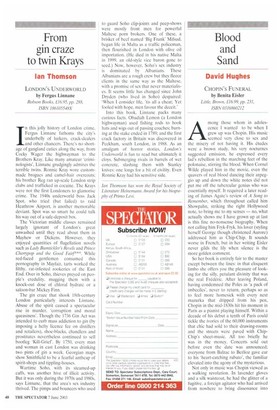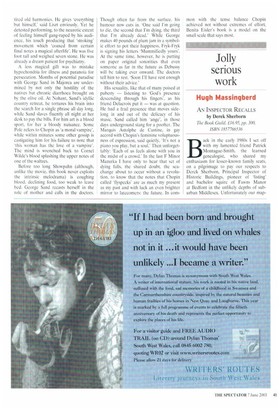CHOPIN'S FUNERAL by Benita Eisler Little, Brown, £16.99, pp. 231, ISBN 0316860212 L mong those whom in adoles
cence I wanted to be when I grew up was Chopin. His music
seemed very close to sex and the misery of not having it. His etudes were a brown study, his very nocturnes suggested emission, he expressed every lad's rebellion in the marching feet of the polonaise, stirring the blood. When Cornet Wilde played him in the movie, even the quavers of real blood dancing their arpeggio up and down the white notes did not put me off the tubercular genius who was essentially myself. It required a later reading of James Agate's review of A Song to Remember, which throughout called him Showpahn, striking the right Hollywood note, to bring me to my senses — no, what actually shows me I have grown up at last is this fine no-nonsense biography. When not calling him Fryk-Fryk, his lover (styling herself George though christened Aurore) addressed him as Chip-Chip. It sounds worse in French, but in her writing Eisler never gilds the lily when silence is the more golden comment.
So her book is entirely fair to the master except between the lines: in that eloquent limbo she offers you the pleasure of looking for the silly, petulant divinity that was the real Frederic. After leaving Poland, having condemned the Poles as 'a pack of imbeciles'. never to return, perhaps so as to feel more homesick with every next mazurka that dripped from his pen. Chopin in the mid-1830s hit his moment in Paris as a pianist playing himself. Within a decade of his debut a tenth of Paris could tickle the ivories of the 60,000 instruments that chic had sold to their drawing-rooms and the streets were paved with ChipChip's sheet-music. All too briefly he was in the money. Concerts sold out before even the date was announced; everyone from Balzac to Berlioz gave ear to his 'heart-catching rubato", the familiar elevated into the agony of the mysterious.
Not only in music was Chopin viewed as a walking revolution. In lavender gloves and a silk waistcoat, he had the glitter of a fugitive, a foreign agitator who had arrived from nowhere to bring dissonance into tired old harmonies. He gives 'everything but himself,' said Liszt enviously, Yet he detested performing, to the neurotic extent of feeling himself gang-raped by his audience, his touch producing that 'stroking' movement which 'coaxed from certain final notes a magical afterlife'. He was five foot tall and weighed seven stone. He was already a dream patient for psychiatry.
A less magical gift was to mistake hypochondria for illness and paranoia for persecution. Months of potential paradise with George Sand in Majorca are undermined by not only the hostility of the natives but chronic diarrhoea brought on by the olive oil. At Nohant, Sand's idyllic country retreat, he tortures his brain into the search for a single phrase all day long, while Sand slaves fluently all night at her desk to pay the bills. For him art is a blood sport, for her a bloody nuisance. Some Pole refers to Chopin as 'a moral vampire', while within minutes some other gossip is castigating him for his failure to note that 'this woman has the love of a vampire', The mind is wrenched back to Cornel Wilde's blood splashing the upper notes of one of the waltzes.
Before too long Showpahn (although, unlike the movie, this book never exploits the intrinsic melodrama) is coughing blood, declining food, too weak to leave bed, George Sand recasts herself in the role of mother and calls in the doctors.
Though often far from the surface, his humour now cuts in. 'One said I'm going to die, the second that I'm dying, the third that I'm already dead.' While George makes 40 pounds of plum jam in a symbolic effort to pot their happiness, Fryk-Fryk is signing his letters 'Mummifiedly yours'. At the same time, however, he is putting on paper original sonorities that even someone as far in the future as Debussy will be taking ever onward. The doctors tell him to rest. 'Soon I'll have rest enough without their advice.'
His sexuality, like that of many poised at puberty — listening to 'God's presence descending through his fingers', as his friend Delacroix put it — was at question. He had a frail presence that moves sidelong in and out of the delicacy of his music. Sand called him `ange', in those days underground slang for a poofter. The Marquis Astolphe de Custine, in gay accord with Chopin's feminine voluptuousness of expression, said quietly, 'It's not a piano you play, but a soul.' Then unforgettably: Each of us feels alone with you in the midst of a crowd. In the last F Minor Mazurka I have only to hear that set of dying falls, the shared doubt, the seachange about to occur without a revolution, to know that the notes that Chopin called 'flyspecks' are as much my present as my past and with luck an even brighter mirror to latecomers: the future. In com
mon with the tense balance Chopin achieved not without extremes of effort, Benita Eisler's book is a model on the small scale that says most.











































































 Previous page
Previous page